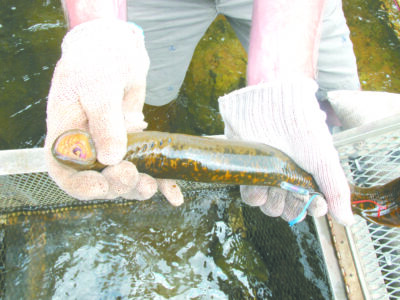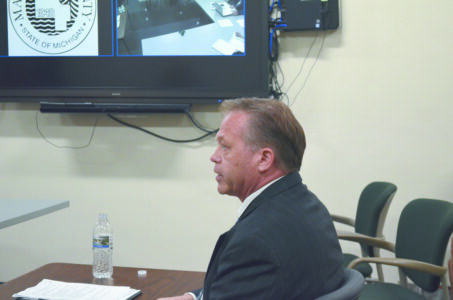Vaccinations recommended for teens ages 12-15
MARQUETTE — The Michigan Department of Health and Human Services is recommending that providers begin vaccinating adolescents 12 to 15 years of age following a Wednesday vote by the Centers for Disease Control and Prevention’s Advisory Committee on Immunization Practices supporting that recommendation.
It is also recommended that the COVID vaccine can now be administered at the same time, or on the same day, as other vaccines in both children and adults.
“It’s great news to have a safe and effective vaccine available to protect younger Michiganders as we work to eliminate COVID-19 once and for all,” Gov. Gretchen Whitmer said in a statement.
As a parent, she said she encourages all parents with children in this group to have a conversation with their family doctors about the vaccine as soon as possible.
MDHHS was to issue guidance to vaccine providers on the use of the Pfizer-BioNTech COVID-19 vaccine in Michiganders 12 to 15 years of age. The guidance follows authorization of the vaccine for this age group by the U.S. Food and Drug Administration under an expanded emergency use authorization.
Providers could have begun vaccinating this age group as soon as Thursday.
For vaccination scheduling, the Marquette County Health Department has an online form for individuals ages 12 and over who live in the county at https://hipaa.jotform.com/210674224388155. The form is for first doses only.
“Having a vaccine authorized for a younger population is a critical step in the fight against COVID-19 in Michigan,” said Dr. Joneigh Khaldun, chief medical executive and chief deputy for health, in a statement. “This allows for younger Michiganders to be protected from COVID-19, bringing us closer to returning to a sense of normalcy and to ending the pandemic.”
According to the State Emergency Operations Center, although most children with COVID-19 have mild or no symptoms, some children can get severely ill and require hospitalization. There have also been rare cases of children dying from COVID-19 and its effects, including multisystem inflammatory syndrome in children, or MIS-C.
From March 1, 2020, through April 30, 2021, approximately 1.5 million COVID-19 cases in individuals 11 to 17 years of age have been reported to the CDC. In Michigan, more than 102,000 cases and 11 deaths have been reported in ages 10 to 19. Children and adolescents generally have a more mild COVID-19 reaction as compared to adults.
Minors ages 12 to 17 will need a parent or legal guardian to provide written consent for COVID-19 vaccination. As with any vaccination for adolescents, it is recommended that adolescents have eaten and are well hydrated prior to their vaccination.
The Pfizer-BioNTech vaccine is administered as a series of two doses, 21 days apart, following the same dosage and dosing regimen for those 16 years of age and older. The most commonly reported side effects in the adolescent clinical trial participants, which typically lasted one to three days, were pain at the injection site, tiredness, headache, chills, muscle pain, fever and joint pain. With the exception of pain at the injection site, more adolescents reported these side effects after the second dose than after the first dose.
Health leaders urge vaccines for teens
Doctors and state and national public health leaders on Thursday urged Michigan parents to get their 12- to 15-year-old children vaccinated with Pfizer-BioNTech’s vaccine.
Parents can find a vaccination site by visiting Michigan.gov/COVIDVaccine or calling 2-1-1.
“To date, 138 million doses of the Pfizer COVID-19 vaccine have been administered to people age 16 and older in the U.S., and the data continues to show that the vaccine is safe and effective,” said Veronica McNally, president of the Franny Strong Foundation, founder of the I Vaccinate campaign and voting member of the CDC’s Advisory Committee on Immunization Practices, in a statement.
In Michigan, more than 4 million doses of the Pfizer COVID-19 vaccine have been administered to people 16 and older.
“This is wonderful news coming on the heels of Michigan hitting its first milestone of the ‘Vacc to Normal’ plan earlier this week, with 55% of Michiganders having received at least one dose of the COVID-19 vaccine,” said Kerry Ebersole Singh, director of the Protect Michigan Commission, in a statement. “And now, a new age group will have access to this safe and effective vaccine.”
Dr. Mona Hanna-Attisha, pediatrician and director of the Michigan State University and Hurley Children’s Hospital Pediatric Public Health Initiative, emphasized that while most children and teens with COVID-19 have mild symptoms or no symptoms at all, the virus can be serious for some, especially those with certain underlying conditions, such as asthma or diabetes.
“During the recent surge in Michigan, we saw a marked increase in serious pediatric COVID cases requiring hospitalization,” Hanna-Attisha said in a statement.
EMS services addressed
While Michigan EMS services have been pushed to the brink by the pandemic, Michigan’s elected officials have yet to prioritize funding for ambulance services in the state budget, said two groups close to the issue.
After initial budgets passed the Michigan Legislature this week without additional funding for EMS, the Michigan Association of Ambulance Services and the Michigan Association of Fire Chiefs reported they have urged state leaders to properly fund EMS agencies, who haven’t seen a true funding increase in more than 20 years.
“Despite inadequate funding, Michigan EMS agencies have been making operations work for decades, but now we have been pushed to the edge,” said Jack Fisher, MAAS president and executive director of Medic 1 Ambulance in Berrien County, in a statement. “The severe underfunding in our industry combined with significant pandemic-related costs have backed us into a corner and now we need help to survive.
“We are asking for state leaders to prioritize EMS so we can prioritize the health of Michigan residents.”
To reverse the severe underfunding EMS has faced in Michigan for decades, MAAS and MAFC want state leaders to include a $10 million increase in state funding for EMS services to bolster Medicaid reimbursement rates. Currently EMS services are only reimbursed for 10% to 25% of their costs.
“It is a privilege and honor to respond to calls for emergency services. However, the financial burden has created greater challenges on EMS services,” said MAFC President Jeff Roberts, chief of the downstate Wixom Fire Department, in a statement. “EMS services are essential to our communities and we take great pride in the services we provide. Now it’s time to properly fund our services so we can continue to focus on saving lives.”
Michigan EMS agencies haven’t received a rate increase paid by the state since 2000 and payments have been reduced twice since then, the groups said.






